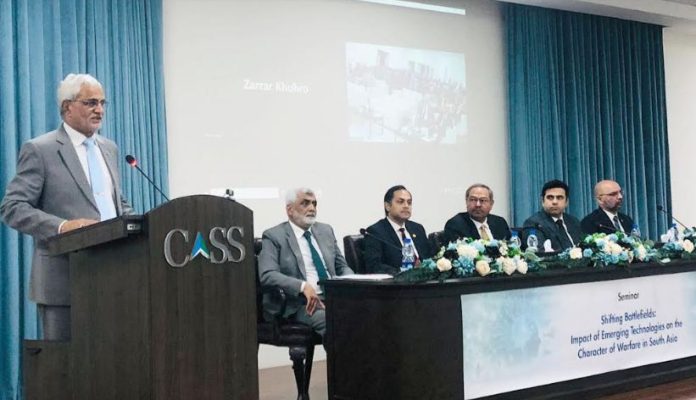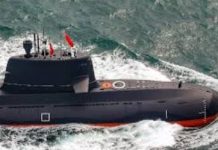DNA
ISLAMABAD: The Centre for Aerospace & Security Studies (CASS), Islamabad, successfully hosted a seminar titled ‘Shifting Battlefields: Impact of Emerging Technologies on the Character of Warfare in South Asia’. This event convened distinguished experts from the defence, technology, and academic sectors to discuss the transformative role of emerging technologies in modern warfare, with a particular focus on South Asia.
Air Marshal Farooq Habib (Retd), Senior Director at CASS, opened the seminar by stressing the complexity and unpredictability of technological evolution in military contexts. He emphasised the necessity for Pakistan’s defence sector to adapt and evolve in response to these advancements to maintain strategic and tactical superiority.
Lieutenant General Aamer Riaz (Retd), former President of the National Defense University, in his Keynote Address, underscored the profound influence of technological advancements on the character of warfare. He predicted a technological upheaval, highlighting the need for strategic adaptation to innovations in space, cyber, AI, and more. General Riaz called for a revision of traditional warfare strategies to include emerging technologies that are redefining conflict dynamics.
Mr Fawad Zahir, a Defence and Strategic Studies Expert, focused on the importance of airpower, enhanced by big data analysis, quantum computing, and Machine Learning. He urged for robust civilian-military collaboration to harness technological advancements for defence purposes. Mr Zahir also strongly advocated strategic investment in technologies that align with Pakistan’s core defence needs, given the country’s budgetary constraints.
Prof. Dr Yasar Ayaz, Chairman/CPD of the National Centre of Artificial Intelligence (NCAI), highlighted AI’s potential to revolutionise warfare, marking it the third major evolution after gunpowder and nuclear power. He stressed the importance of indigenous development of AI technologies to ensure strategic autonomy and technological sovereignty, highlighting the need for a balance between innovation and regulatory oversight.
Mr Khawaja Mohammad Ali, a Cyber Security, Data Privacy, and Digital Forensics Expert, delineated the critical role of cyber operations in modern conflict, advocating for the establishment of a national cybersecurity authority; extensive training and awareness programmes; cyber diplomacy; and indigenous development in cybersecurity solutions.
Senior Journalist and Columnist, Mr Zarar Khurro, focused on the strategic importance of narrative building in the context of advanced technological warfare. He discussed the long-term process of narrative construction facilitated by technology,
pointing to the need for authenticity and the significant impact of social media on public opinion. President CASS-Islamabad, Air Marshal Farhat Hussain Khan (Retd), in his Concluding Remarks, reiterated the critical importance of first-shot capability in modern warfare, driven by advancements in sensors and detection technologies. He called for an indigenisation strategy that supports the development of homegrown technologies, ensuring that Pakistan’s defence sector remains competitive and innovative.
The seminar underscored the urgent need for Pakistan to embrace indigenisation and support homegrown technologies for enhanced national security and defence autonomy. As emerging technologies continue to reshape the landscape of modern warfare, strategic, policy-oriented approaches are essential for Pakistan to deal with the challenges and opportunities presented by this new era of conflict.
The presentations were followed by active participation from a diverse audience, including retired military officers, scholars, journalists, and students, who engaged in an interactive Question and Answer session, further enriching the discourse on this critical subject.












